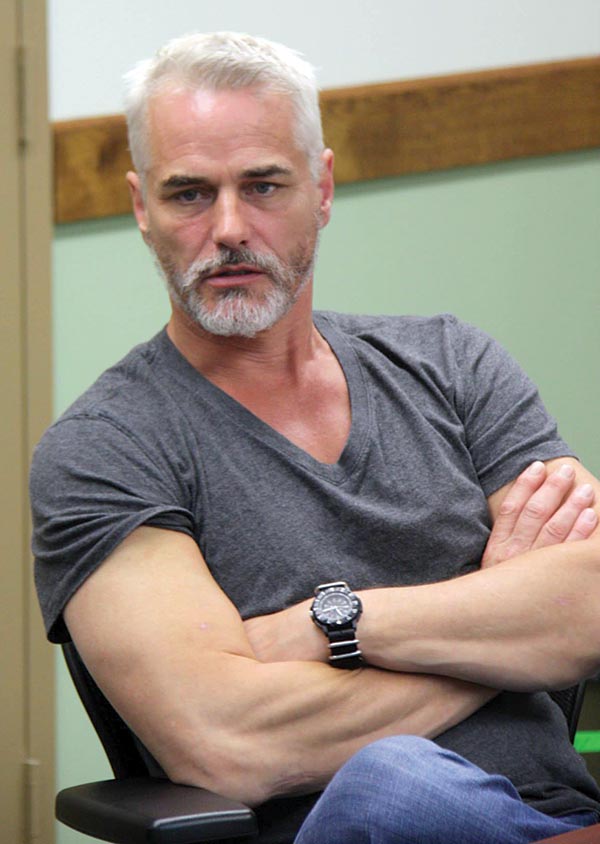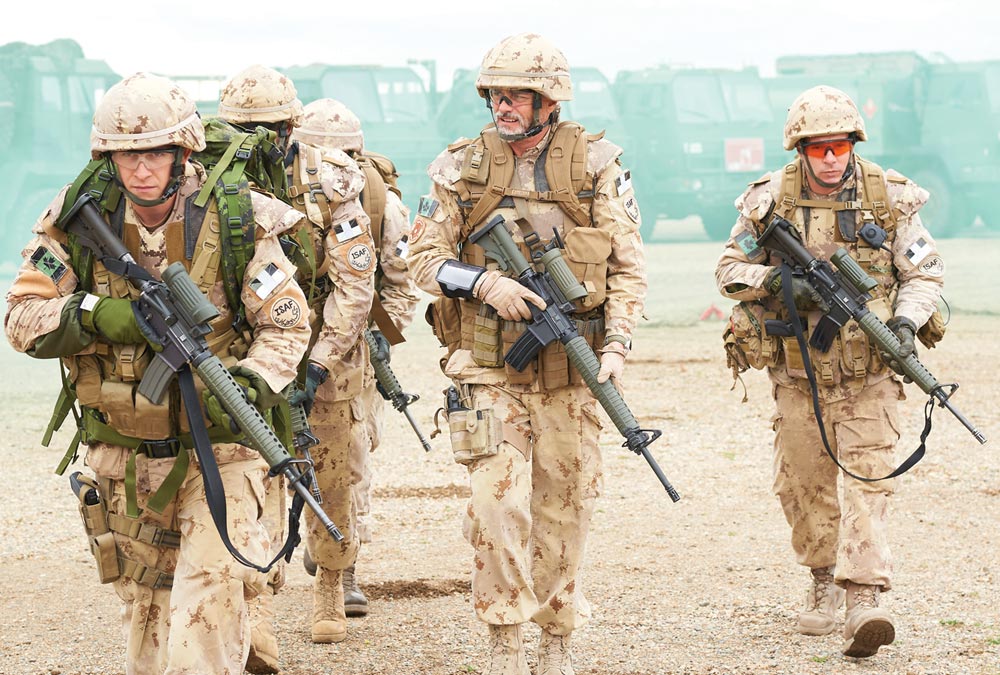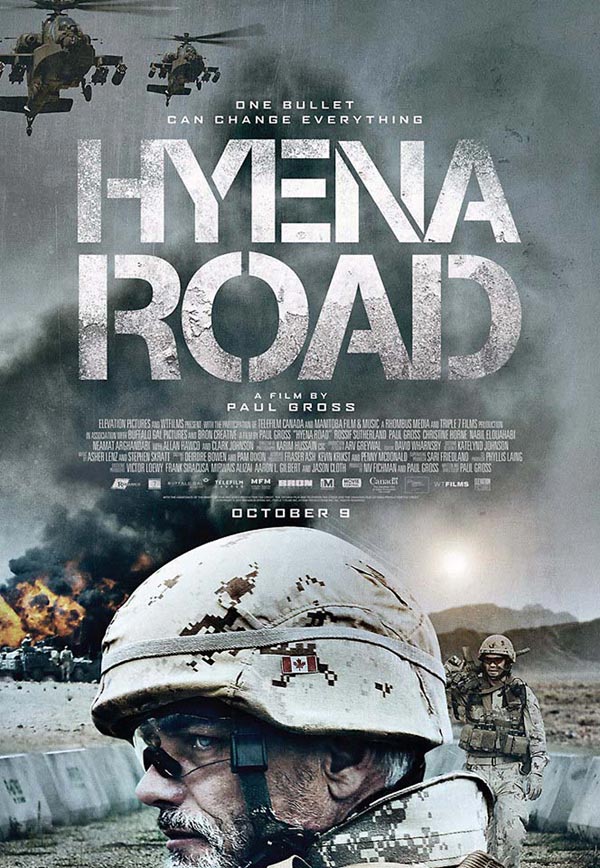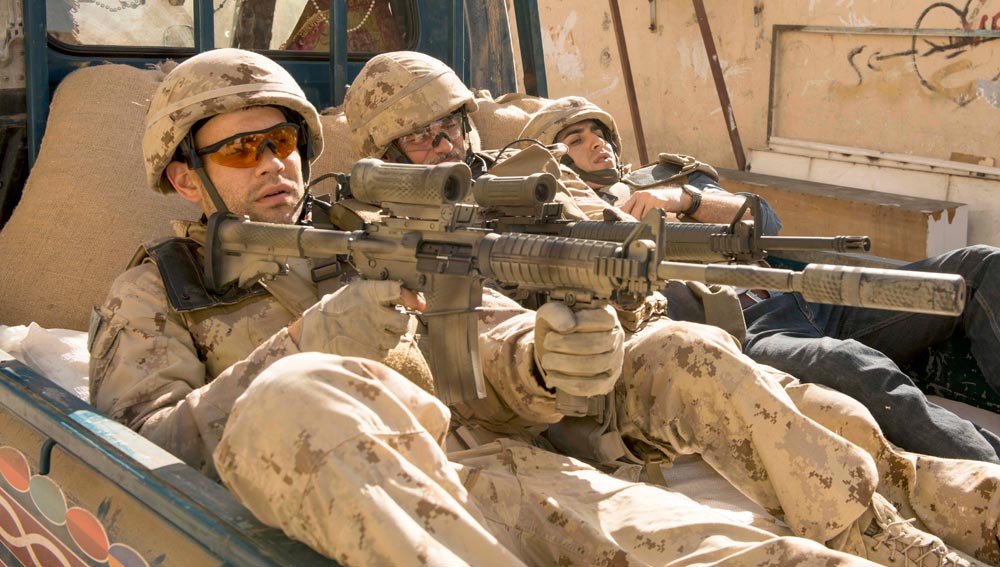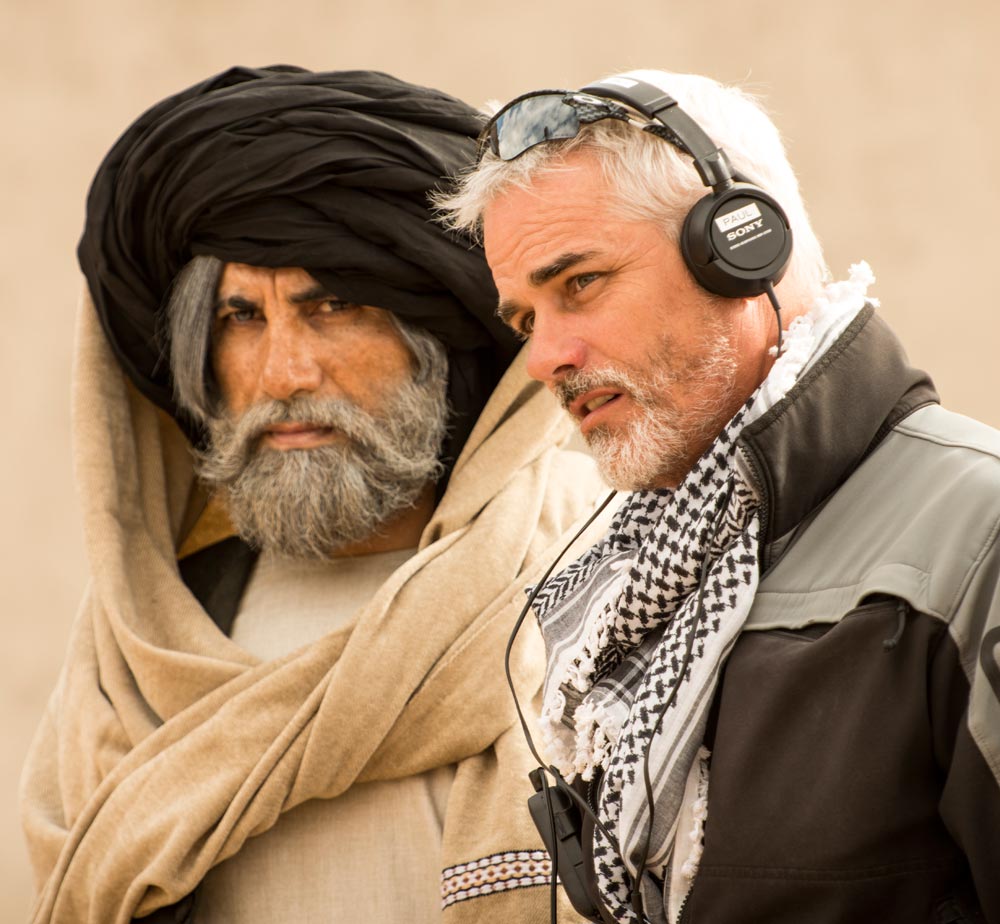Sarah Francis
Shilo Stag
Paul Gross didn’t want to make another war movie, but then he found himself hearing the stories of those who served in Afghanistan.
Hyena Road is based on the “1,000 true stories” of the men and women he met who have served in Afghanistan and the Canadian Armed Forces (CAF). The Passchendaele director and star is no stranger to the military. Gross grew up with a father in the CAF.
A large part of the inspiration for the movie was the time he actually spent in the war zone with soldiers in 2010. He said the experience wasn’t what he thought it would be. “I was just mesmerized by it. I’ve been in a lot of weird places and screwed up places, but I’ve never been in an actual war zone. It was completely fascinating,” he recalled. “It seemed to be completely different from anything I had expected. What governments had told us, what various media — what had been in the newspapers and stuff — it didn’t seem to correlate.
“I went back a year later with a camera team and I photographed stuff. It was in that trip, talking to soldiers — all of the events in the film come from anecdotes from speaking to soldiers — and I’m thinking, there might be something in here.”
Canada’s involvement in Afghanistan lasted for more than a decade, something Gross said is significant for our country.
“I think it’s important for us to do something about a conflict we were involved in for longer than the First World War, Second World War and Korean War combined.” With a laugh he added, “Nobody else in Canada would be dumb enough to try to do it. I thought, ‘Well I guess it will have to be me.’”
He said the film could provide viewers with an idea of what went on and the environment our fellow citizens were immersed in. Some of the feedback received by civilians included people commenting they were unaware of how complex the war in Afghanistan was.
Gross said it seemed crazy he was as unaware as he was of what the military men and women were being asked to walk into.
“I think we were largely pretty ignorant of what it was we were asking them to do. It’s no political position. I have no axe to grind about whether we should or should not have been in Afghanistan or should or should not be involved in future engagements. I do think we ought to know what we’re talking about.”
A major aspect of Hyena Road shows movie goers how modern warfare is conducted, and shows those who watch the film how different it is from the First and Second World Wars. “There aren’t a bunch of Nazis standing in a field that we can recognize because they’re wearing Nazi uniforms and were going to go and kill them. It’s completely different,” he explained.
Gross said it hit him when he was out on a foot patrol with the Quebec-based Van Doos. He said there was a soldier leading the patrol who was about 25, from Rimouski, Que., and with a very thick accent. He had a hard time catching everything this young man was saying. During the foot patrol they met with some elders and a translator.
“This kid is talking to the translator to ask a question and I know for a fact the translator did not understand the question, there was no way. I [was] barely getting it because of the accent. I thought, ‘This is crazy!’ We’re asking a reasonably young man to be a good leader to a group of soldiers and we’re asking him to be the leading edge of our foreign policy. I don’t think most of us understand that. It was never the case in any other conflict before, that we were asking people to do these really complicated jobs.”
Gross has received a number of comments from viewers, civilian and military, and he said they do have some words of caution.
“In fact, we’ve had just a little bit of trouble occasionally with guys who are still working through PTSD. It can be a bit of a trigger, so we’ve been trying to say to people, it could do this. It’s like what you put out in a live theatre saying, ‘If you’re epileptic, strobe lights are used and it may be a trigger.’ I was really wasn’t anticipating that. It didn’t even cross my mind. “
He said that’s a testament to the accuracy of the film. Noting, although you can’t please everyone, the movie is as accurate as possible.
“We went to enormous lengths to make sure everything in there is for real. No call signs or anything that doesn’t actually roughly happen. Or at least I could point to someone from the CAF who gave me advice on it. “
Gross added they didn’t specify a time the movie takes place to help keep accuracy.
“It changed a lot over the years. It was a very long time we were there and the mission was evolving a lot. For instance there was a guy who was at Sperwhan Ghar, he was from Shilo. He was 2PPCLI. I don’t think they’ve had them in rotation since 2008. I was there in 2010 with a camera. He was looking in our art department, all the pictures of the Base are up on the wall and he said, ‘That’s not what Sperwhan Ghar looks like.’ [I said,] that actually is Sperwhan Ghar — when were you there? He said, ‘Oh wow, that got built up then.’ So that was [it], everything was always shifting there. Including strategies and tactics and all that stuff. I think most soldiers who have had experience with Afghanistan will say, ‘That’s it, it’s as close as we can get in movies.’”
The inspiration for the movie was from the many stories and perspectives he heard from soldiers, and even Afghan people, while visiting the country. Those stories were used to create the plot, which Gross said seemed to just fall into place. His initial idea was to do a story on snipers, predominately because of practicality. However, he then met an intelligence officer who was travelling with them who gave another perspective.
“He started telling me his side of the war. They were completely unrelated it seemed at first, what the kinetic side and the non-kinetic side was doing. It was through that intelligence officer that I met the Afghan characters. The Cleaner is a real guy and the Ghost is a real guy. They worked with us over there and I thought of course we have to have the Afghans in the film. They were our partners over there.”
Involving those characters is something that sets this movie apart from Clint Eastwood’s American Sniper or other similar American war movies.
“You almost never had the people in the country that you’re supposedly fighting for,” he said. “They don’t even seem to exist.”
Some aspects of the movie even came from his own experiences. While they were travelling through the area with the CAF he said his life was in the hands of the soldiers accompanying them. One instance of his time there is represented in the movie by a “press girl” going out on a foot patrol.
“This guy is giving them a speech about, “Don’t do this and don’t do that. Here’s your tourniquet, quick clot and bandage.’ She says, ‘I don’t know how to use that.’ The guy says, ‘Well if it needs to be used it won’t be you using it.’ That was actually said to me the first time I went out.
“The first thing he said to me was not to step on something unusual. He started to walk away and I’m like, ‘Wait, get back here! You’ve gotta narrow this down, this whole [expletive] country is unusual,” he said laughing.
Gross mentioned how being immersed in the environment for only two weeks was exhausting and it gave him an appreciation for what Canadian soldiers go through during the course of their six- to eight-month stay.
Besides filming on this Base, Gross also took cast and crew to Jordan. Having the ability to film in that country gave the film a more realistic feel by helping the actors.
“You have to have stuff in the air, the dust, the feel of it, the heat … the sun has a different quality. All of those things a camera now registers,” explained Gross. “They’re so sensitive. It’s also good for actors. Most of these guys haven’t traveled and we sort of tossed them into this foreign culture.”
Former Stag assistant editor Sarah Francis interviewed Paul Gross prior to a red carpet showing of his movie Hyena Road in the fall of 2015 in Winnipeg, which was filmed initially at CFB Shilo before moving on to Jordan. Photo Jules Xavier/Shilo Stag
Actor/director Paul Gross played a Canadian intelligence officer in Afghanistan in the film he penned called Hyena Road. He spent time at CFB Shilo shooting some interior scenes using Base Transport, then out in the RTA doing exterior scenes. Submitted publicity photos

